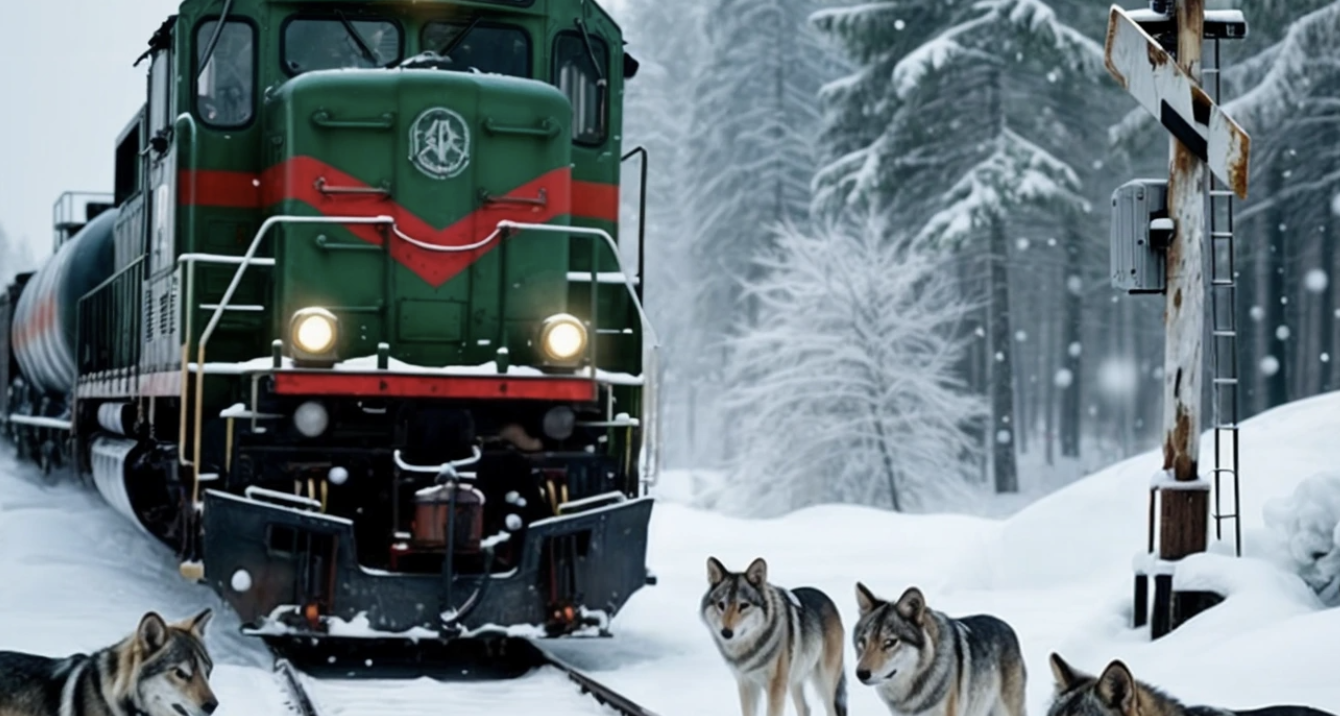Artem had long since grown used to the steel tracks feeling like an extension of his own being. He felt every vibration, every screech of the wheels against the rails not only with his ears, but with every cell of his tired body. He wasn’t just a train driver; he was the guide of a gigantic steel creature, which he carefully led through the endless expanses of the Siberian taiga. This world, frozen in snowy silence, was his own — familiar, comprehensible, and predictable in its harsh majesty.
But on that January day, when the sun was nothing more than a pale yellow blot against a milky-white sky, it was as if the universe itself decided to rewrite the rules of his reality.
Up ahead, on a perfectly straight stretch of track, where the rails pierced the white curtain of forest like dark threads, they were standing. Not moving. Not even twitching. A gray rock made of muscle, fangs, and a gaze that cut straight through to the bone. A pack of wolves.
Artem blinked, thinking it was a mirage born of fatigue and the monotony of the landscape. But ghosts don’t breathe, and from their open mouths clouds of steam burst out, mixing with the icy air.
Since childhood, he had known one unshakable law of the taiga: every living thing, from a tiny field mouse to a mighty elk, runs from the roar and clang of an approaching train. The instinct of self-preservation, pure and undeniable. But these creatures… they weren’t going to give way. They stood there, lined up in a solid wall, and their amber eyes—cold, bottomless—were fixed on the front window of his cab. There was no anger in their posture, no bared, snarling jaws. Only an unshakable, almost ritual resolve. They weren’t just standing on the tracks; they were guarding them.
Artem’s heart, which until then had been beating smoothly in rhythm with the train’s movement, suddenly spiraled into a panicked arrhythmia. Instinctively, he reached for the horn, and the locomotive’s powerful, deafening roar tore apart the crystal silence of the taiga. The sound was so strong that clumps of snow slid from the nearest fir trees. But the wall of flesh and fur did not even flinch. Not a single muscle twitched on their muzzles. They kept staring. Silently. Expectantly.
And then a chill ran down his spine, sharper than any January frost. He understood. He didn’t know how or why, but he knew it with his whole being: they weren’t just standing there. They were protecting. They were pointing. They were showing him something—him, the blind man in a steel box.
Thoughts whirled into a chaotic vortex. The weight of the train was measured in thousands of tons. Even with emergency braking, the stopping distance on this stretch was enormous. Calculations, formulas, regulations—all of it flashed through his mind and crumbled to dust in the face of that silent summons. His hand, heavy as if cast from lead, settled on the cold steel of the emergency brake lever. He pulled it toward himself.
The world plunged into a piercing, shrieking howl. The thunder of hundreds of coupled cars rebelling against the sudden stop filled the universe. Wheels locked against the rails sent out showers of blinding sparks that seemed to set the very air on fire. Artem gripped the control wheel until his knuckles turned white, his body tensed, bracing for the inevitable, horrifying impact—a collision with living flesh that would leave a scar on his soul for the rest of his life.
But the impact never came.
The silence that followed the screech was deafening. The train, shuddering with its colossal body, came to a halt. It stopped just a few meters away from the motionless gray wall. Breathing hard, Artem couldn’t tear his gaze away from the front window. And then something happened that he would never have believed if someone had simply told him about it.
The wolves, still silent, slowly and majestically, as if on an invisible command, stepped aside. Then took another step. They didn’t scatter. They parted, forming a living corridor leading to the very center of the track. It was the most solemn and terrifying gesture Artem had ever seen in his life. They had drawn back the curtain.
And behind that curtain, right on the sleepers, lay a figure. Small, hunched, helpless. Without realizing what he was doing, Artem jumped out of the cab, his feet sinking into the loose snow. He ran closer. It was an old man. His face was pale, lined with wrinkles and veins of exhaustion, his clothes torn to shreds. He was trying to push himself up on his elbows, but his strength was leaving him.
“Grandpa?” Artem’s voice broke into a whisper.
The old man slowly lifted his eyes to him, and in that extinguished gaze the driver saw a glimmer of something familiar.
“Semyon?” Artem breathed, leaning lower. “Semyon Petrovich?”
It was him. The old forester who lived in a hut on the edge of the forest. Artem had known him since childhood—his slow stories about the habits of wild animals, about the secrets of the sleeping taiga. The very man who had always seemed like an inseparable part of this wild world.
Only now, as his gaze dropped lower, Artem saw the most horrifying detail. The old man’s thin, almost fragile arm was clasped in the cold steel of a handcuff. The second cuff was tightly wired to the rail itself. The skin on his wrist had been rubbed raw, and the red stain on the white snow looked screamingly bright.
Gritting his teeth, Artem rushed back to the cab. He found a crowbar and, with a titanic effort that made the steel groan and the chain links ring, managed to tear those bonds apart. Gently, he lifted the weakened Semyon Petrovich in his arms and carried him into the warm cab, sitting him down in his own seat.
He gave the old man hot tea from his thermos and wrapped him in his work jacket. And then, slowly, with long pauses, from Semyon Petrovich’s lips poured a story that made the blood run cold. These were not wild beasts hunting a human. These were people—the most terrifying of predators. Poachers whose dark trade he had been disrupting for years with his principles. They had decided to get him out of the way. Not just to kill him, but to stage an execution, making it look like an accident under the wheels of a train. They had left him there, bound, doomed, savoring his helplessness.
“I wasn’t expecting anything anymore,” Semyon Petrovich said quietly, gazing at the snowy distance beyond the glass. “I heard the horn… thought that was it. Forgave everyone, thought about the forest, about the animals… And then they came.”
“Who?” asked Artem, though he already knew the answer.
“My wolves,” the old man smiled faintly. “That same old family I’ve been watching all these years. They came out of the thicket. Slowly. Surrounded me. Stood around. And froze. At first I thought… I got scared. But they weren’t looking at me. They were looking ahead, at the track. They stood like a wall. And then I understood. They weren’t letting you… letting us… pass. They made me visible.”
Artem listened, and everything inside him turned upside down. These predators—these creatures people liked to paint as merciless killing machines—had come out to protect the one who had been protecting them for decades. They couldn’t bite through the steel of the handcuffs, but they could give their lives to stop the steel monster. They had become a living shield, a silent cry for help that was heard. Without this living, breathing wall, without their wordless yet eloquent act, the man who had been their guardian would have remained nothing more than another sad statistic on this endless strip of track.
Many years passed after that day. Semyon Petrovich recovered, and the story of his rescue spread through all the neighboring settlements, turning into legend. But for Artem, the world was never the same. Every time he passed that very bend in the track, that same patch of slumbering taiga, he would always gently shift the control lever, reducing speed. And he would peer closely—very closely—into the dense thicket of snow-covered firs, into the blue shadows that fell between the trunks. Sometimes it seemed to him that deep there, in the white silence, fleeting gray shapes flickered. They never stepped into the open, never came out to meet him. They simply were. Watching. Standing their invisible watch.
And in those moments Artem was filled with a strange, warm feeling that had no name. It wasn’t just joy or relief. It was a deep, universal understanding. He had realized that in a world where human bonds so often fall apart, there exists another connection—ancient and beyond time. A bond of trust, mutuality, and silent loyalty. He understood that the loudest words may remain unheard, while the most important message can be conveyed without a single sound—only by a gaze full of dignity, and the silent steadfastness of those whom we once, foolishly, considered nothing more than beasts.
And now, guiding his train through blizzards and nights, Artem knew for certain: somewhere out there, in the forest enchanted by swirling snow, under the cold, shimmering stars, the very soul of the taiga stands quiet and eternal on duty—wild, noble, and infinitely grateful.



